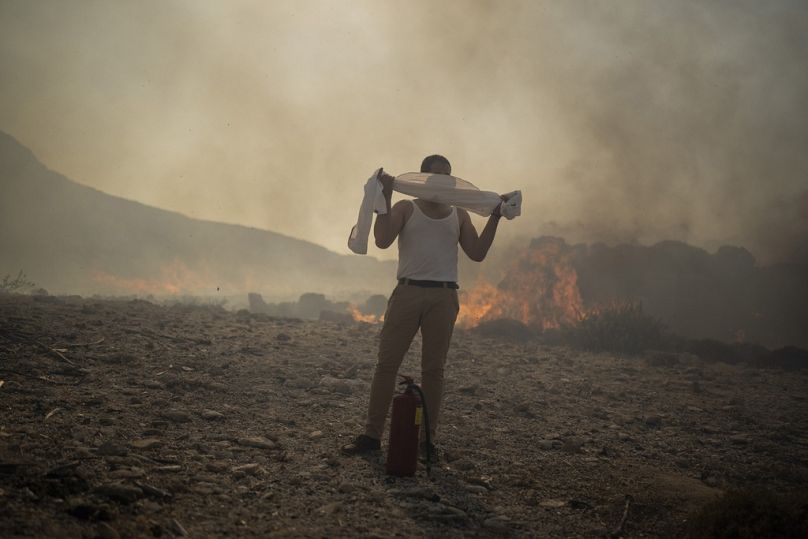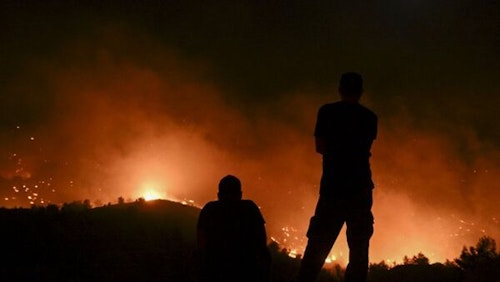A week-old wildfire on the Greek resort island of Rhodes tore past defenses Monday, forcing more evacuations as strong winds and successive heat waves that left scrubland and forests tinder-dry fueled three major fires raging elsewhere in Greece.
The latest evacuations were ordered in south Rhodes after 19,000 people, mostly tourists, were moved in buses and boats over the weekend out of the path of the fire that reached several coastal areas from nearby mountains. It was the country's biggest evacuation effort in recent years.
 ADVERTISEMENT
ADVERTISEMENT
 ADVERTISEMENT
ADVERTISEMENT
“We are at war - completely focused on the fires,” Prime Minister Kyriakos Mitsotakis said during a debate in parliament. “Over the coming days and weeks, we must remain on constant alert.”
Help continued to arrive from the European Union and elsewhere, with firefighting planes from neighbouring Turkey joining the effort on Rhodes, where 10 water-dropping planes and 10 helicopters buzzed over flames up to five metres tall despite low visibility.
Temperatures reached the low 40s Celsius in parts of the Greek mainland Monday, a day after soaring as high as 45 degrees.
Evacuations were also ordered overnight on the western island of Corfu, where more than 2,000 people were moved to safety by land and sea, as well as on the island of Evia and in a mountainous area in the southern Peloponnese region.
European Commission President Ursula von der Leyen tweeted that she contacted the prime minister late Sunday to offer additional assistance as Greece "is confronted with devastating forest fires and a heavy heat wave due to climate change.”
In Greece, an average of 50 new wildfires have broken out daily for the past 12 days, according to government spokesperson Pavlos Marinakis. On Sunday, 64 new blazes were recorded.
Authorities said no serious injuries were reported, but hospitals and health volunteers provided first aid to tourists and others, mostly for the effects of heat and dehydration.

 ${title}
${title}
Live ended
Summary
- Follow our live blog below for all the events on Monday 24 July as they unfolded.
- Devastating wildfires are continuing to sweep through Greece for a sixth consecutive day
- Mass evacuations have been ordered on several Greek islands, with tens of thousands taken to safety
- Searing temperatures and high winds are set to continue until Wednesday
- Countries from around the world have dispatched support to the fire-afflicted nation
That's the end of our live coverage of the Greece wildfires, and evacuations of local residents and tourists, on Monday 24 July.
Follow our website www.euronews.com for all the latest updates.
WATCH: Aerial shots show the devastation from Greek island fires
Watch video of the scale of the fires below ⬇️
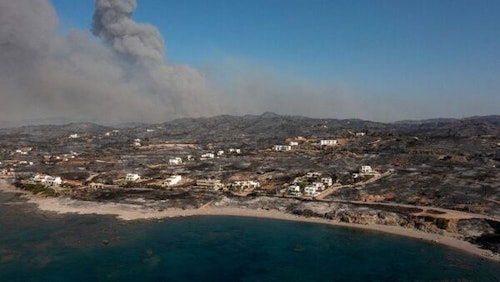
📸 Picture: Greek fireman rescues rabbits and a cat from the flames
A fireman holds a cat and two rabbits after rescuing them from a fire between the villages of Kiotari and Gennadi, on the Greek island of Rhodes on Monday 24 July.
Firefighters tackled blazes that erupted in peak tourism season, sparking the country's largest-ever wildfire evacuation -- and leaving flights and holidays cancelled. Tens of thousands of people have already fled blazes on the island of Rhodes, with many frightened tourists scrambling to get home on evacuation flights.
Animal charities have been urging local residents not to leave their pets behind if they have to evacuate their homes. [AFP]
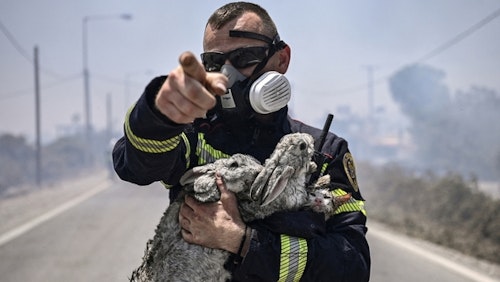
Airport evacuations continue in Rhodes
Seasonal workers lying on beach towels, vacationers in bathing suits slumped on chairs: Rhodes airport looks like an improvised camp on Monday due to the fire that is ravaging part of this very touristic Greek island.
In the departures hall of the international airport, many holidaymakers, waiting for a flight to return to their country, share the stories of their "evacuation in nightmarish conditions" from the hotels and holiday residences where they were staying at the edge of the Aegean Sea.
Among them, Daniel-Cladin Schimdt, a 42-year-old German tourist, who came on vacation with his wife and their nine-year-old son to the coast of Kiotari, the southeastern region of the island.
"We are exhausted and traumatized," he told AFP. "I don't think we really realise what happened." After the hotel alarm sounded on Saturday, "we were evacuated to the beach," he recalls.
"There were thousands of people, the buses couldn't pass, we had to walk for more than two hours (…) We couldn't breathe, we covered our faces to move forward. It's a miracle," he says, overcome by emotion.
Facing the coasts of Turkey, Rhodes, which had 2.5 million visitor arrivals in 2022, is one of the main resort destinations in Greece, with numerous hotels all along its eastern shores.
During the course of Saturday and Sunday, some 30,000 people were evacuated as a precaution against the advance of the flames, the largest evacuation operation ever carried out in Greece, according to firefighters.
On Monday as the fire raged for the seventh day in a row, other residential areas had to be evacuated, such as Asklipio where the village bells started ringing to mark the evacuation order.
"Suddenly, we saw the fire just outside" the village, testified Giorgos Latos, an 83-year-old pensioner, who was drinking his morning coffee at the time. [AFP]
Greek islanders worry the heat will hit tourism and wreck harvests
Kos is one of the most popular Greek islands with tourists and each year around 1.3 million people choose to go there for their holidays. Read more at our story here ⬇️
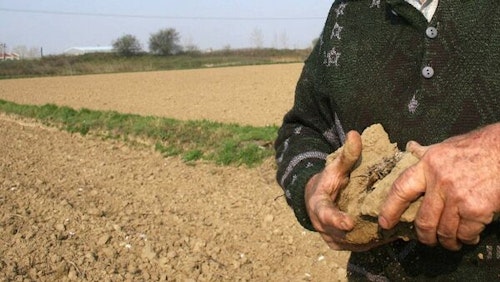
Greek PM says 'we are at war' against wildfires
A weeklong wildfire on the Greek island of Rhodes tore past defenses Monday, forcing more evacuations, as three major fires raged elsewhere in the country fueled by strong winds and successive heat waves.
The latest evacuations were ordered in south Rhodes after 19,000 people, mostly tourists, were moved in buses and boats over the weekend out of the path of the fire that reached several coastal areas from nearby mountains.
“We are at war -– completely focused on the fires,” Prime Minister Kyriakos Mitsotakis said during a debate in parliament. “Over the coming days and weeks, we must remain on constant alert.”
Help continued to arrive from the European Union and elsewhere, with Turkish firefighting planes joining the effort in Rhodes, where eight water-dropping planes and 10 helicopters buzzed over flames up to five metres tall despite low visibility.
“The risk of fire will be extreme in several areas of Greece today,” Fire Service spokesperson Vassilis Vathrakogiannis said a day after temperatures on the southern Greek mainland soared as high as +45°C. [AP]
Unprecedented heat wave scorches north Africa
This catastrophic heatwave is not only affecting Europe.
Tunisia will approach 50 degrees on Monday, even in the more temperate northern areas.
That's 6 to 10 degrees more than normal for this season, reports AFP.
Authorities in neighbouring Algeria are also on high alert, with temperatures peaking at 48 in five eastern provinces.
Amid these unprecedented temperatures, power consumption has soared as people fire up the air conditioning to keep cool, with the Algerian public energy group Sonelgaz seeing a record peak on Sunday.
Prices of airconditioning units have shot up from 300 to 500 euros recently or become impossible to find, according to the French press agency.
(AFP)
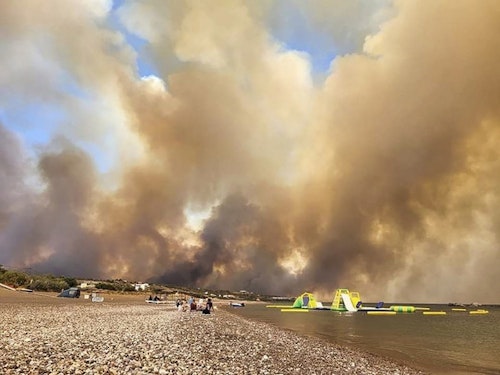
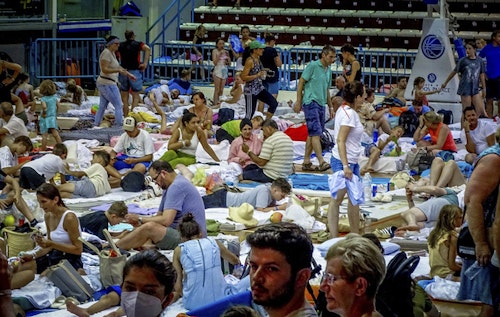
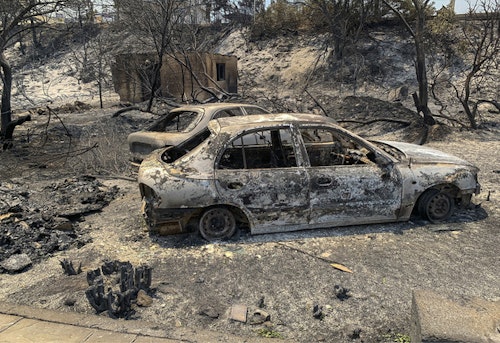
Forest fire red alert in France
Parts of France were placed on red alert for forest fires on Monday, requiring the highest level of vigilance.
The warning is for the southeastern Bouches-du-Rhone department, with weather conditions making the risk of a blaze very high in vegetated and forested areas.
An alert system was set up last year, following savage wildfires in the country last year.
(AFP)
Greece 'at war' with wildfires, says PM
Greek Prime Minister Kyriakos Mitsotakis said on Monday his country is fighting a war against wildfires, warning more tough days were in store.
Greece has "three more difficult days" ahead of it due to soaring temperatures, he told Parliament.
"We are at war against fires," Mitsotakis said, noting that 32,000 precautionary evacuations were carried out over the weekend on the tourist hotspots, Rhodes and Corfu.
He claimed that Rhodes will remain Grece's tourism "flagship", adding that only 10% of visitors to the island had been effected by the blaze.
(AFP)
Recent wildfires across Europe
"Out of control", "unprecedented", "gigantic": each year, forest fires in Europe are more violent and spread over a longer period, like those on the Greek island of Rhodes, which led to an operation to evacuate tourists without precedent.
Since 2018, more and more hectares have been swallowed up in flames year after year: 117,356 hectares - more than ten times the area of Paris - went up in smoke in the EU in 2018.
2019: 295,835 hectares
2020: 339,824 hectares
2021: 470,359 hectares
Last year, in 2022, more than 785,000 hectares were destroyed, according to figures from the European Forest Fire Information System (Effis) and the European climate change program Copernicus.
Since Effis was created in 2000, the most devastating year recorded was 2017 when 988,087 hectares of vegetation was destroyed by wildfires. [AFP]
Carried to safety
A man carries a child as they leave an area where a forest fire burns, on the island of Rhodes on Saturday. Thousands of tourists and local residents have been evacuated from the Greek island as wildfires raged closer to suburban areas and tourist hotels. [AP]
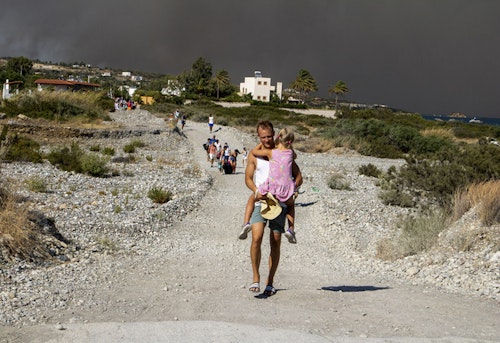
British tourists tell of six-hour evacuation
Kelly Squirrel was on holiday in Rhodes when police ordered her to evacuate her hotel.
"We had to walk non-stop. We walked for about six hours in the heat", she told AFP after arriving at Rhodes international airport.
Another British tourist Kevin Sales described the situation as "terrible".
"We had to lend a woman my wife's clothes because she had nothing to wear," the English engineer told AFP.
At dawn on Monday morning, two helicopters and two water bombers resumed their operations to support the firefighters on the island, which was engulfed in flames for the seventh consecutive day.
In nearby Corfu, the authorities warned residents and holidaymakers in a number of small towns to leave their homes "as a precaution" via a mobile phone alert. [AFP]
Corfu launches evacuation as wildfires rip through Greece
Firefighters struggled through the night to contain 82 wildfires across Greece - 64 of which started on Sunday. Read more at our story here:
Corfu situation 'better now', says deputy mayor
Theofanis Skembris, the deputy mayor of North Corfu, has said that most fires on the island are under control.
"The situation on the island is better now," he told the British BBC. "Most of the fires are under control. There are firefighting airplanes helping. I believe that everything will be over soon."
The official claimed fires were started deliberately, saying the fire department's "unofficial assumption is that it was arson - fires can't start simultaneously in four different places."
However, he said an investigation was first needed.
UK gov deploys team to support nationals in Greece
The British government says it has sent a "rapid deployment team" to help its nationals on Rhodes.
On Twitter, Foreign Secretary James Cleverly said their "safety is our top priority", adding UK officials were in "close contact" with their Greek counterparts.
Some 19,000 people have been evacuated from Rhodes, where the most serious fires have burnt for six days.
The island is a popular tourist hotspot, especially with British nationals.
Red weather warnings still in force across Greece
Red weather warnings remain in place around Greece, amid a devastating heatwave.
Temperatures will widely be in the high 30s and low 40s on Monday, with strong gusts of wind between 32 and 48 kph causing a particular headache for firefighters in the southern part of the Aegean Sea.
Weather conditions look set to improve from Wednesday, as winds ease and temperatures cool down to the low 30s.
On Sunday, Greece hit its joint fourth-highest temperature on record, with the mercury climbing to 46.4 in Gythio.
Egypt dispatches aid to Greece
Egypt is sending Chinooks to help Greece fight wildfires, it announced on Sunday.
Cairo will send three helicopters, equipped with advanced equipment to put out fires, Egyptian Armed Forces’ Spokesman Gharib Abdel-Hafez said in a statement.
Egypt's assistance is part of President Abdel-Fattah El-Sisi's directive to help countries in crisis, the spokesman added.
Thousands evacuated from Corfu - fire service
Nearly 2,500 people were evacuated in Corfu overnight, according to a spokesperson for the Greek island's fire service.
Residents and holidaymakers in the north were asked to leave their homes as a precautionary measure.
The fire broke out on Sunday and continues to rage in the touristic hotspot.
Firefighters have dispatched two helicopters, but baking temperatures and high winds today could possibly hamper their efforts and worsen the blaze.
(AFP)
Good morning, this is the Euronews live blog.
We'll be providing up-to-the-minute coverage of the devastating wildfires currently sweeping through Greece.











